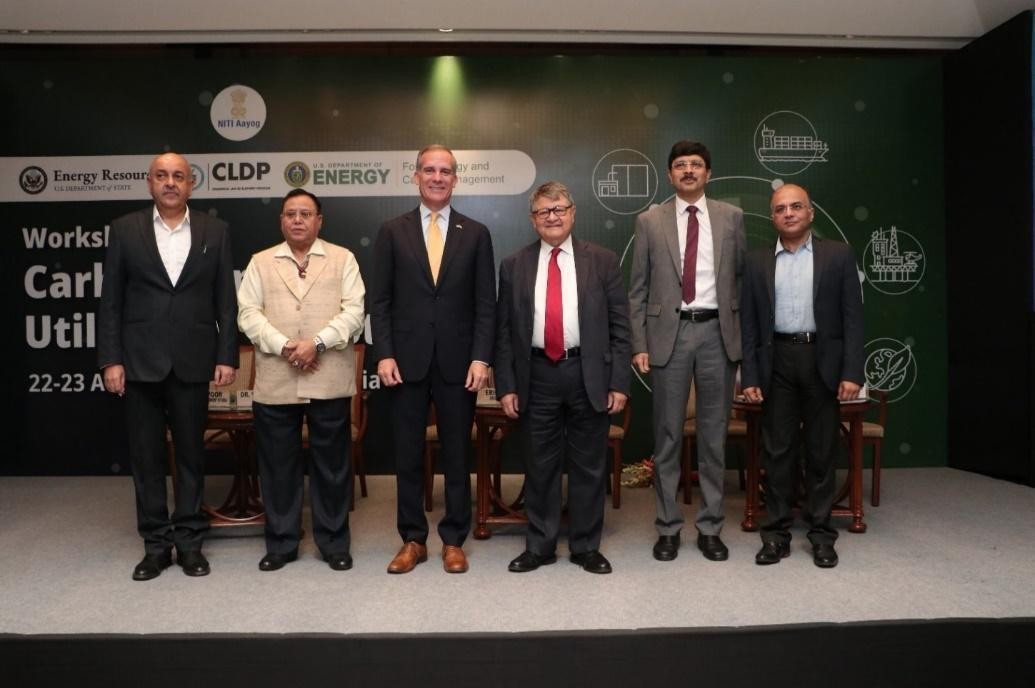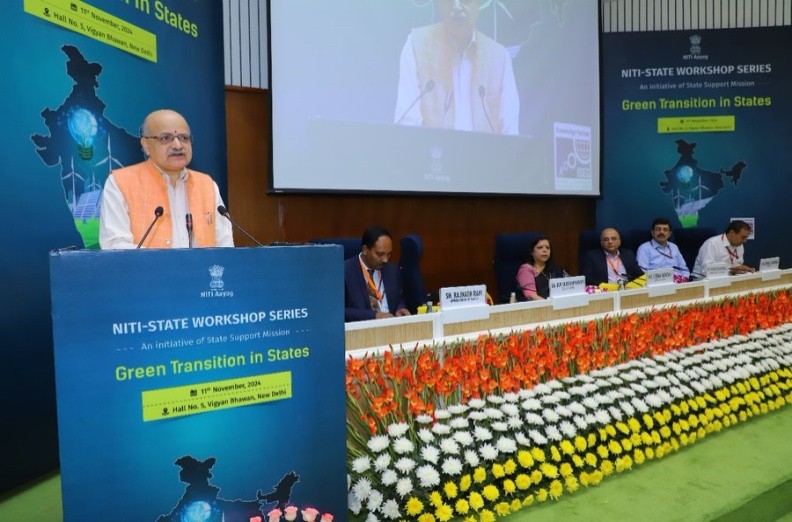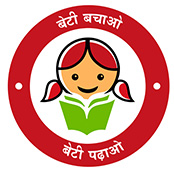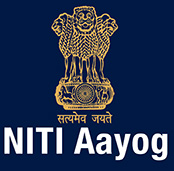- Overview
-
The Energy Division of NITI Aayog serves as a pivotal institutional anchor in India’s energy transition architecture, functioning at the intersection of policy formulation, strategic coordination, and techno-economic analysis. As India navigates the complex terrain of energy security, decarbonization, and sustainable development, this division plays a central role in aligning national priorities with global best practices and emerging technologies.
By integrating policy foresight, data-driven planning, and cross-sectoral coordination, the Energy Vertical acts as a systems integrator—provide and independent assessment and strong coordination among the ministries/departments. Its work ensures that India’s energy transition is not only technically feasible and economically viable, but also socially inclusive and environmentally sustainable
- Core Functions
-
Key Activities and Thematic Engagements
The Energy Vertical undertakes a wide array of initiatives that span both conventional and emerging energy domains:
- Technology & Policy Initiatives
- Carbon Capture, Utilization & Storage (CCUS)
- Small Modular Reactors (SMRs) for nuclear energy
- Coal gasification and clean coal technologies
- Advance Chemistry Cell Manufacturing
- High efficiency Solar Cell and Module Manufacturing
- National Green Hydrogen Mission
- Decarbonization Pathways
- India Energy Security Scenario 2047
- Sectoral roadmaps for hard-to-abate industries such as steel, cement, and chemicals
- Lifecycle Assessment (LCA) studies to evaluate environmental footprints
- Net-zero transition modelling and policy alignment through various inter-ministerial Working Groups
- India Climate Energy Modelling Forum
- Energy Data Management
- India Climate Energy Dashboard
- GIS map for Indian energy infrastructure
- Removal of discrepancies on data in consultation with MoSPI and BEE
- Providing Support to MoEF&CC on finalising NDC goals
- Bioenergy & Circular Economy
- Promotion of biogas and compressed biogas (CBG) ecosystems
- Studies on sustainable biomass utilization and logistics
- Research and Networking
- Conducting studies in new emerging technologies/ areas relevant for the Energy Sector
- International Partnerships & Knowledge Diplomacy
- Engages in bilateral and multilateral collaborations on clean energy, climate tech, and standards harmonization.
- Participates in global forums (IEA, IRENA, COP) to align domestic priorities with international commitments.
- Examination of various proposals of stakeholder’s ministries/departments related to energy/energy transition and climate goals: on the following parameters
Policy Analysis
The Energy Division deals with five key sectors: power, coal, petroleum and natural gas, new and renewable energy, and atomic power and examines the following types of proposals:
- Project proposals of SFC/EFC/PIB/PPRs for investment decisions
- DPRs related to oil and gas, power, new and renewable energy, coal, climate-related issues pertaining to energy, and furnishing comments on technical and financial feasibility
- Proposals in the form of Cabinet Notes/sector for CCEA, Committee on Establishment Expenditure (CEE)/Cabinet Committee on Security
- Joint ventures/subsidiary proposal of Ministries
Infrastructure Review by Prime Minister
- To coordinate and provide support in organising review meetings on outcome-based energy infrastructure projects, chaired by the Hon’ble Prime Minister of India.
- To provide support in preparing output-outcome based budget for the Ministries of Power, Coal, New and Renewable Energy, and Petroleum and Natural Gas.
Committees and Sub-Committees on Energy Sector
To constitute committees for resolving inter-sectoral issues pertaining to the energy sector and preparing policy documents and strategy papers. The energy team actively participates in various committees and groups constituted by the respective Ministries.
- Technology & Policy Initiatives
- Relevant Stakeholders/ Ministries/ Departments
-
- Ministry of Coal
- Coal Controller Organisation
- CMPDIL
- Ministry of Power
- Central Electricity Authority
- Bureau of Energy Efficiency
- Ministry of Petroleum and Natural Gas
- Director General of Hydrocarbons
- Petroleum Planning and Analysis Cell
- Department of Atomic Energy
- Ministry of New and Renewable Energy
- State Governments/Departments
- Knowledge Partners
- TERI
- Vasudha Foundation
- CEEW
- C-STEP
- CSEP
- Ministry of Coal
- Who's Who
-
Name
Designation
EMAIL ID
Dr. Anshu Bharadwaj Sr. Consultant, as Program Director anshu[dot]bharadwaj[at]niti[dot]gov[dot]in Sh. Rajnath Ram Adviser rajnath-pc[at]nic[dot]in Sh. Manoj Kumar Upadhyay Deputy Adviser mk[dot]upadhyay[at]gov[dot]in Mrs. Poonam Kapur Research Officer poonam[dot]kapur[at]gov[dot]in Dr. Anjali Jain Consultant G-2 anjali[dot]jain25[at]nic[dot]in Sh. Anurag Sachan Consultant G-2 anuragkumar[dot]sachan[at]niti[dot]gov[dot]in Dr. Sapna Bisht Consultant G-2 sapna[dot]bisht[at]niti[dot]gov[dot]in Sh. Fayaz Ahmad Tantray Consultant G-1 tantray[dot]fayaz[at]niti[dot]gov[dot]in Sh. Sharvan Kumar Pushkar Consultant G-1 sk[dot]pushkar[at]niti[dot]gov[dot]in Sh. Ravi Kumar Consultant G-1 kumar[dot]ravi1990[at]niti[dot]gov[dot]in Dr. Sunil Sansaniwal Consultant G-1 sk[dot]sansaniwal[at]niti[dot]gov[dot]in Sh. Vishal Kumar YP vishal[dot]kumar02[at]niti[dot]gov[dot]in Sh. Prince Tiwari YP tiwari98[at]nic[dot]in Sh. Chandrabhal Chakraborty YP chandrabhal[dot]c[at]niti[dot]gov[dot]in Sh. Devanshu Vishwakarma YP devanshu[dot]v[at]niti[dot]gov[dot]in Sh. Atul Kumar Shrivastava YP atulkumar[dot]s[at]niti[dot]gov[dot]in Ms. Srishti Dewan YP srishti[dot]dewan[at]niti[dot]gov[dot]in Sh. Saksham Agarwal YP saksham[dot]agarwal[at]niti[dot]gov[dot]in Sh. Anurag Pandey YP anurag[dot]p95[at]niti[dot]gov[dot]in List of Officers on Secondment basis:
Name
Designation
Organization
EMAIL ID
Sh. Venu Gopal Mothkoor Energy and Climate Modelling Specialist Vasudha Foundation venu[dot]mothkoor[at]nic[dot]in Sh. Vipul Gupta Executive (Sustainable Development) NTPC Ltd. vipulgupta01[at]ntpc[dot]co[dot]in Ms. Anupama Kumari Assistant Manager (Energy Policy) Vasudha Foundation anupama[at]vasudhaindia[dot]org Sh. Sounak Mukherjee Assistant Manager (Energy Policy) Vasudha Foundation sounak[at]vasudhaindia[dot]org - Partners
-
Organization
Collaboration/Support
Link
CSIR – National Environmental Engineering Research Institute (NEERI) Analysis of Historical Ambient Air Quality Data along with Emission from coal-based Thermal Power Plants for Developing a Decision Support System https://www.neeri.res.in FSR – Florence School of Regulation, New Delhi Support regulatory hub, collaborate on sustainable infrastructure research and share technical knowledge https://fsrglobal.org/ Rockefellar Foundation, USA Improving electricity access in India for economic development. https://www.rockefellerfoundation.org/ Shakti Sustainable Energy Foundation, New Delhi Collaboration on climate, energy modelling, dashboards, scenarios, and roadmap development http://shaktifoundation.in/ Global Energy Alliance for People and Planet (GEAPP Service Co India Ltd) Enabling energy transition policies, supporting states, fostering innovation, and creating financing tools. https://energyalliance.org/ Ashoka Centre for a People Centric Energy Transition (ACPET), New Delhi Developing IESS 2047 modules for Net Zero pathways, aligned with Panchamrit goals. https://www.acpet.ashoka.edu.in/ Alternate Capital Association (IVCA), New Delhi Developing IESS 2047 modules for Net Zero pathways, aligned with Panchamrit goals https://www.ivca.in/ McKinsey & Company India LLP, New Delhi Collaboration on green transition, energy, and climate. https://www.mckinsey.com/in/ NIAS – National Institute of Advanced Studies Study on Enhancing Domestic Coking coal availability to reduce the import of the Coking Coal https://www.nias.res.in NTPC Ltd., New Delhi Collaboration on NTPC’s Net Zero GHG roadmap aligned with Panchamrit goals https://ntpc.co.in/ Indian Space Research Organisation (ISRO) Development of GIS Map https://www.isro.gov.in/ The Energy and Resources Institute (TERI), New Delhi Modelling, Policy Paper, Data Management https://www.teriin.org/ Council on Energy, Environment and Water Policy Paper, Research Study https://www.ceew.in/ Centre for Study of Science Technology and Policy (CSTEP), Bengaluru Modelling, Policy Paper, Data Management https://www.cstep.in/ Prayas (Energy Group), Pune India Energy Dashboards, India Energy Modelling Forum https://www.prayaspune.org/ Alliance for an Energy Efficient Economy (AEEE), New Delhi Research and policy development in the area of the Energy Efficiency https://aeee.in/ IIT Bombay India Energy Security Scenario 2047 Version 3.0 https://www.iitb.ac.in/ IIT Delhi India Energy Modelling Forum https://home.iitd.ac.in/ IIT Kanpur Knowledge partner for MESSAGEix https://www.iitk.ac.in/ IIT (ISM) Dhanbad Study on the future coal scenario in India till 2050 https://www.iitism.ac.in/ University of Petroleum and Energy Studies, Dehradun Research, Modelling and paper writing on Energy Sector policies https://www.upes.ac.in/ Energy Policy Institute at the University of Chicago, India (EPIC, India) Research and Policy analysis for air quality, quality, reliability and access of electricity https://epic.uchicago.in/ US Energy Information Administration (EIA) Sustainable Growth Pillar, Energy Data Management https://www.eia.gov/ United State Agency for International Development (USAID) US India Sustainable Growth Pillar https://www.usaid.gov/ United Kingdom Department of Business, Energy and Industrial Strategy (UKDBEIS) Technical support for India Energy Security Scenario 2047 Version 3.0 https://www.gov.uk/government/organisations/department-for-business-energy-and-industrial-strategy International Energy Agency (IEA) Research and Policy analysis of the energy sector, energy data management training, workshop on the Power Sector Transformation, Energy Policy Dialogue https://www.iea.org/ Lawrence Berkley National Laboratory (LBNL) US India Sustainable Growth Pillar https://www.lbl.gov/ Institute of Energy Economic, Japan (IEEJ) Research and Policy analysis and modelling activities https://eneken.ieej.or.jp/en/ The Rockefeller Foundation, USA Work related to Electricity Access and Benchmarking of the DISCOMs https://www.rockefellerfoundation.org/ World Resources Institute Research and Policy Analysis of the energy sector https://www.wri.org/ India Smart Grid Forum Work related to smart grid, battery storage, hydrogen, electric cooking, regional grid and RE integration https://indiasmartgrid.org/ FICCI Organising Stakeholder consultations on energy sector policies http://ficci.in/ CII Organising Stakeholder consultations on energy sector policies https://www.cii.in/ Embassy of Netherlands Research and Policy paper preparation on climate change, battery storage, modelling projects https://www.netherlandsandyou.nl The World Bank Technical Assistance for Battery Storage Demand Assessment https://www.worldbank.org/en/home Rocky Mountain Institute Light house of Discoms, Battery Energy Storage programs https://rmi.org Vasudha Foundation Maintaining and Developing India Energy Dashboard (ICED 3.0) and Developing State Energy Climate Index Round II https://www.vasudha-foundation.org - Reports
-
Title Download Scenarios Towards Viksit Bharat and Net Zero- Social Implications of Energy Transition (Vol. 11) 
Scenarios Towards Viksit Bharat and Net Zero- Sectoral Insights: Agriculture (Vol. 6) 
Scenarios Towards Viksit Bharat and Net Zero- Sectoral Insights: Buildings (Vol. 5) 
Scenarios Towards Viksit Bharat and Net Zero- Sectoral Insights Waste (Vol. 8) 
Scenarios towards Viksit Bharat and Net Zero - Sectoral Insights: Power (Vol. 7) 
Scenarios towards Viksit Bharat and Net Zero - Sectoral Insights: Industry (Vol. 4) 
Scenarios towards Viksit Bharat and Net Zero - Sectoral Insights: Transport (Vol. 3) 
Scenarios towards Viksit Bharat and Net Zero: Critical Mineral Assessment: Demand and Supply (Vol. 10) 
Study Report on Scenarios towards Viksit Bharat and Net Zero: An overview (Vol. 1) 
Scenarios towards Viksit Bharat and Net Zero: Macroeconomic Implications (Vol. 2) 
Scenarios towards Viksit Bharat and Net Zero: Financing Needs (Vol. 9) 
Roadmap for Green Transition of MSMEs 
Roadmap for Cement Sector Decarbonaisation 
Roadmap for Aluminium Sector Decarbonisation 
Coal Gasification Technology for Indian High Ash Content Coal 
Analysis of Historical Ambient Air Quality Data along with Emission from coal-based Thermal Power Plants for Developing a Decision Support System 
Enhancing Domestic coking coal availability to reduce the import of coking coal 
CEEW - Roadmap for Access to Clean Cooking Energy in India Report 
Deliberations of the Task Force on Roadmap for India on Solar & Wind Energy beyond 13th Plan 
Developing a Carbon Neutral Resource Efficient Strategy for Ladakh UT 
Development of an Energy Information Portal for India 
Development of an enhanced version of India Energy Dashboards 
Diagnostic Study for Power Distribution 
Draft Battery Swapping Policy 
Electricity Access & Utility Benchmarking 
Energy Storage System (ESS) Roadmap for India: 2019 - 2032 
INDIA ENERGY DASHBOARDS - Version 2.0 
India Green Stimulus Report 
Integrated Modelling Study of Energy-Water-Food Nexus in India 
NITI Aayog & GIZ - National Sensitization Workshop on State Energy Action Plan 
NITI IEA Workshop on Energy Statistics and Building an Energy Balance in India 
Perspectives of Global and Domestic Companies on Advanced Chemistry Cells Battery Reuse and Recycling 
Report Committee on Low Carbon Technologies 
Report of the Inter-Ministerial Committee on Energy Data Management 
RMI and NITI Aayog Discom Transformation Platform Post Workshop Report 
State Energy & Climate Index - Round I 
The Role of Small Modular Reactors in the Energy Transition 
India Energy Security Scenarios 2047 Link Weblink to IESS 2047 Link Brochure of IESS 2047 
Report on IESS 2047 
LNG as a Transportation Fuel in Medium & Heavy Commercial Vehicle Segment 
India Climate & Energy Dashboards Version 3.0 Weblink to ICED 3.0 Link Brochure of ICED 3.0 
Carbon Capture, Utilization and Storage (CCUS) 
Geospatial Energy Map of India - Brochure
- Video of Vice Chairman, NITI Aayog
- Video of Member, NITI Aayog
- Video of CEO, NITI Aayog
- Video of Director, SAC-ISRO
 View View View View
View View View ViewTurning Around the Power Distribution Sector by NITI and RMI 
RE-Integration report, jointly launched by NITI and IEA 
Roadmap for Ethanol blending in India 2020–25 
Report of Comprehensive Economic and Environment Impact of Coal Washing in India by TERI 
Electricity Access in India and Benchmarking Distribution Utilities 
IEA India 2020: In-Depth Energy Policy Review 
NITI Aayog and World Bank: Energy-Water-Agriculture Nexus 
NITI Aayog and GIZ: National Sensitisation Workshop on State Energy Action Plan 
Report of the Energy Storage System (ESS) Roadmap for India: 2019–32 
Roadmap to Fast Track Adoption and Implementation of Energy Conservation Building Code (ECBC) at the Urban and Local levels 
State Renewable Energy Capacity Addition Roadmap 
India’s Leapfrog to Methanol Economy 
Energising India 
Report of the Workshop on Energy Modelling and Launch of Energy Data Portal (dashboard) on 12 May 2017 at NITI Aayog 
Report on India’s Renewable Electricity Roadmap 2030 
A Report on Energy Efficiency and Energy Mix in the Indian Energy System (2030) Using India Energy Security Scenarios, 2047 
Energy Efficiency Interventions at NITI Aayog 
Report of Expert Group on 175 GW RE By 2022 
Final Report on “Domestic Manufacturing Capacity & Potential Cyber Security Challenges in the wind sector and Way Forward” 
Report on “Developing Chemistry agnostic standards for energy storage technologies” 
LNG as a Transportation Fuel in Medium & Heavy Commercial Vehicle Segment 
Report on Carbon Capture, Utilisation, and Storage (CCUS) Policy Framework and its Deployment Mechanism in India 
Report of the Inter-Ministerial Committee on just Transition from Coal 
Harnessing Green Hydrogen Opportunities For Deep Decarbonisation In India 
- Current and Upcoming Projects
-
THINK-TANK ACTIVITIES
Energy Modelling and Data Management:
-
India Energy Security Scenarios 2047 (IESS 2047)
NITI Aayog launched the third version of the India Energy Security Scenarios (IESS) 2047 on 20th July 2023 to develop various pathways for India’s energy transition, including those aimed at achieving energy security by 2047 and net-zero emissions by 2070. The tool projects activity demand across all energy sectors including transport, industry, buildings, cooking and agriculture, performs supply-demand balancing, and evaluates their implications for emissions, costs, land use, and water resources through 2047. It serves as an interactive platform to support ministries and departments in developing diverse energy transition scenarios aligned with national climate and development goals.
The IESS also allows for in-house estimation of national energy needs, thereby reducing reliance on external modelling agencies. The tool is now being expanded to 2070 to develop and analyze various pathways to achieve net zero. Future upgrades will include integration with other models to capture behavioural shifts, macroeconomic dynamics, and climate impacts, enabling deeper and more comprehensive scenario analysis. For more information, check out this link https://iess2047.gov.in/
-
India Climate and Energy Dashboard
NITI Aayog released the India Climate Energy Dashboard (ICED) on 20th July 2023. ICED is a one-stop platform providing consolidated and regularly updated data on India’s climate and energy landscape. It offers key insights across energy supply, demand, emissions, and climate policies, serving as a resource for policymakers, researchers, and the public. The portal also has in-built Analytics to track the Climate Action Progress. With over 500 parameters, 2000 infographics, and interactive visualisations, ICED 3.0 provides a detailed view of India's energy sector and a number of interactive visualisations, allowing users to gain a holistic understanding of India's energy sector.
The tool has recently included new sections and features to enhance data accessibility and user-friendly experience:
- State Report: A comprehensive profile of each state, covering economy, demographics, electricity generation, and distribution
- Solar Irradiance: to dive into location-specific monthly and daily average solar irradiance data across India.
- Bio Fuels: to explore the yearly data on Ethanol blending with petrol and ethanol contribution from different feedstock.
- End-Use (under Energy): Access detailed data on industry capacity, production, consumption, and trade; household metrics and appliance production in buildings; transport trends including EV vs. ICE registrations and railway electrification; and agriculture statistics on crop area & production and irrigation pumps at national and state levels- alongside energy and fuel consumption across sectors. For more information, check out this link https://iced.niti.gov.in/
-
Geospatial Energy Map of India:
NITI Aayog, in collaboration with the Indian Space Research Organisation (ISRO), has developed a comprehensive Geospatial Energy Map of India. This interactive platform offers an integrated overview of the country’s energy landscape, covering both renewable and non-renewable power plants, oil and gas infrastructure, fossil fuel resources, renewable energy potential, and other key energy assets. The map supports effective energy resource planning by enabling informed decisions for infrastructure development, such as siting of solar parks, coal blocks, crude oil and natural gas pipelines.
Recent updates to the portal include enhancements to 27 thematic layers and the addition of advanced tools like the Wind Energy Site Selection Tool and the Solar Site Selection Tool. These upgrades aim to provide greater granularity and decision support at the state, district, and block levels. The platform continues to be regularly updated to improve its usability for energy planning and policymaking.
-
State Energy Climate Index
NITI Aayog launched the State Energy & Climate Index (SECI) Round I in April 2022 to assess the performance of States and Union Territories across six key areas: 1) DISCOM Performance 2) Access, Affordability, and Reliability of Energy 3) Clean Energy Initiatives 4) Energy Efficiency 5) Environmental Sustainability 6) New Initiatives
The index has served as a benchmarking tool to foster healthy competition and promote best practices among states. Building on its success, NITI Aayog has now initiated work on SECI Round II, incorporating feedback received from the Ministry of Power (MoP) and other stakeholders. SECI Round II is being developed with an expanded set of indicators, revised weightages, and a refined scoring methodology to better reflect evolving energy and climate priorities. The updated index aims to guide states in energy transition, climate action, and inclusive development.
-
India Climate and Energy Modeling Forum
The India Climate and Energy Modeling Forum (ICEMF) is a collaborative initiative led by NITI Aayog to strengthen evidence-based policy-making for India’s energy and climate goals. It brings together leading Indian research institutions, think tanks, and government stakeholders to develop and harmonize long-term energy and emissions scenarios, particularly in support of India’s net-zero commitments. The forum facilitates peer learning, model inter-comparisons, and the development of nationally relevant assumptions across models like TIMES, IESS, MESSAGEix, EPS, LEAP, and GCAM. By fostering coordination between modelers and policymakers, ICEMF aims to build robust, transparent, and policy-aligned analytical capacity to guide India’s low-carbon development pathways. For more information, check out this link https://icemf.niti.gov.in/
-
Life Cycle Assessment (LCA)
-
Comparative Life Cycle Assessment and Techno-Economic Analysis of Ethanol Production from Sugarcane, Maize, and Rice
This study aims to comprehensively assess the environmental and economic sustainability of ethanol produced from different feedstock, including sugarcane (juice and molasses), maize, and rice. The key objectives include quantifying GHG emissions across the entire value chain, evaluating the Net Energy Ratio (NER) to assess production efficiency, and estimating land and water footprints. Additionally, the study analyzes the true cost of ethanol production, including subsidies, and highlights feedstock-specific advantages and challenges. The findings will support evidence-based policy interventions to enhance ethanol sustainability and guide future decisions on feedstock prioritization.
-
Comparative Life Cycle Assessment of Mobility Technologies
This project compares the life cycle environmental impacts of multiple transport technologies, including electric vehicles, hydrogen fuel cell vehicles, and internal combustion engines. It assesses emissions across vehicle production, energy supply chains, and end-of-life management. The project further aims to develop a tool for stakeholders to assess transport sector environmental impacts and guide decarbonisation strategies. The insights are designed to support evidence-based clean mobility strategies and guide investments in sustainable transport infrastructure.
-
-
Product Carbon Footprint
-
Scoping study to identify products
This study identifies priority industrial products for carbon footprinting based on export relevance, emissions intensity, and data availability. It lays the groundwork for building a national PCF framework to support voluntary disclosures, eco-labelling, and compliance with emerging international norms like the EU CBAM and ESPR. The project also maps data gaps and institutional needs, contributing to India’s strategic roadmap for carbon transparency across key sectors and products.
Policy Reform Initiatives:
-
-
Carbon Capture, Utilization & Storage (CCUS):
India’s primary energy mix is heavily fossil fuel dependent with more than 80% contribution in the primary energy basket. India has committed to achieving the visionary goals of Viksit Bharat by 2047 and Net-Zero GHG Emissions by 2070. The ambitious transition to a green developed economy will require significant efforts in technology development, infrastructure expansion, and financing.
To decarbonize the economy and mitigate emissions, Carbon Capture, Utilisation, and Storage (CCUS) technologies are expected to play a pivotal role. Efficient utilisation of coal reserves and emission reductions in hard-to-abate sectors that rely on coal, oil, and gas necessitate the adoption of advanced technologies and carbon abatement mechanisms such as CCUS.
Recognizing this, NITI Aayog has undertaken pioneering initiatives to facilitate the deployment of CCUS in India. These efforts aim to support the country’s transition toward a sustainable and low-carbon future. The key initiatives include:
 Workshop on “Legal & Regulatory Frameworks and Technical Considerations for Carbon Capture Utilisation and Storage (CCUS)
Workshop on “Legal & Regulatory Frameworks and Technical Considerations for Carbon Capture Utilisation and Storage (CCUS) -
Nuclear Energy Mission for Viksit Bharat:
NITI Aayog estimates suggest that India would require at least 100 GW of nuclear capacity by 2047 and 250-300 GW capacity by 2070 to support increasing energy requirements of an aspirational and sustainable future. NITI Aayog is undertaking various initiatives for nurturing a nuclear energy ecosystem capable of scaling-up domestic manufacturing, construction & operational capabilities, funding, research in advanced technologies, and human capital development.
-
Coal Gasification:
NITI Aayog constituted a Steering Committee on 8th May, 2020 under the Chairmanship of Dr. V.K. Saraswat, Member, NITI Aayog to review the coal gasification mission & projects. As part of this steering committee, a technical standing committee of experts was constituted on 8th May, 2020 to assist on the technical front of the coal gasification initiative.
-
Net Zero Pathways:
India’s Net Zero (NZ) commitment, announced at COP 26 in November 2021, underscores resolution to address climate change while balancing aspirations to become a developed nation by 2047. Achieving NZ necessitates transitioning to clean energy across all sectors while managing socio-economic impacts such as job shifts, revenue changes in fossil-dependent states, and resource constraints.
NITI Aayog has constituted six working groups. The work examines NZ trajectories, utilising tools like IESS 2047 and TIMES-VEDA, supported by the India Climate Energy Modelling Forum (ICEMF). They focus on macroeconomic implications, sectoral shifts, climate finance, R&D, supply chains, and social impacts. The working groups, covering key sectors such as power, transport, industry, agriculture, critical minerals, macroeconomic implications of the transition, climate finance, and the social aspects of energy transition and comprising representatives from ministries, academia, industry, and think tanks, have been constituted to develop actionable recommendations and build stakeholder consensus.
This effort will result in a dynamic policy document providing a comprehensive roadmap for India’s NZ transition. The document will guide ministries, state governments, and industries, adapting over time to reflect advances in technology, policy, and economic conditions, ensuring a just and sustainable transition.
-
Landscape of Climate Finance in India: Financing Pathways for India’s NDC and Net Zero Targets - demand supply, flow estimation:
The study is awarded to Climate Policy Initiative (CPI) in March 2024. The Methodology and approach is being finalized and the output of the study will be used for Climate Finance. The CPI has compiled results that was modelled for Supply availability & Financing gap. The report preparation is underway and the final report is proposed to be submitted by March 2025.
-
Decarbonisation of Hard-to Abate Sectors:
NITI Aayog is developing a comprehensive decarbonisation roadmap for the cement, aluminium, and MSME sectors to guide their transition toward sustainability. The roadmap will identify emission sources along the production value chains and pinpoint key areas for decarbonisation across the end-to-end value chain. It will assess the sectors' competitiveness in light of global developments such as the Carbon Border Adjustment Mechanism (CBAM) and evaluate the readiness of infrastructure and technologies to support decarbonisation. This includes identifying a suite of commercially viable technologies and exploring financial mechanisms like viability funding, incentives, or tax breaks to make emerging technologies feasible. The plan will also focus on leveraging circular economy principles and improving resource efficiency.
-
Bioenergy potential estimation and feedstock availability for competing uses:
The study is aimed at estimating the bioenergy potential and feedstock availability for competing uses. Objectives include Biofuel demand estimation considering announced Government targets for Ethanol, CBG, SAF, Biodiesel, Green Hydrogen, Bio-methanol and Biochar. The study will also analyse supply options including assessment of current estimates, potential role of pricing, evaluation of conversion technologies, impact on food security and land requirement estimation. The study is underway.
NITI-State Workshop Series:
-
Green Transition in States
Spotlighting State-Led Renewable and Clean Energy Efforts NITI Aayog organised a symposium titled 'Green Transition in States' on 11th November, 2024 offering a platform for States to showcase their innovative green transition initiatives, exchange knowledge, and share best practices. The symposium saw participation from over 25 States and UTs. As part of the symposium, a new initiative named 'Accelerating Sustainable State Energy Transition (ASSET)' was launched by Shri B.V.R. Subrahmanyam, CEO, NITI Aayog along with Shri Pankaj Kumar, Secretary, Ministry of Power, Shri Prashant Kumar Singh, Secretary, Ministry of New and Renewable Energy, and Ms. Leena Nandan, Secretary, Ministry of Environment, Forest and Climate Change of India. The initiative is a significant step towards achieving India's energy transition plans at the State level. Through this initiative, NITI Aayog, in collaboration with knowledge partners and multi-national agencies, will help states realise their energy transition plans.
 Workshop titled 'Green Transition in States' on 11th November, 2024
Workshop titled 'Green Transition in States' on 11th November, 2024
-
Energy
 National Portal Of India
National Portal Of India 








